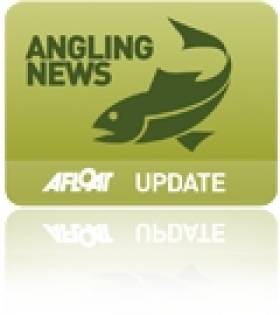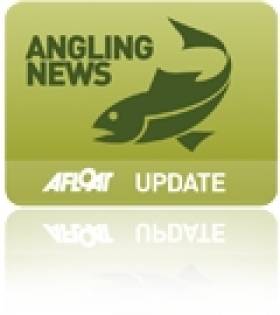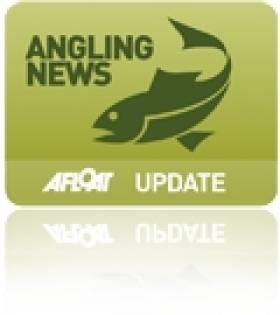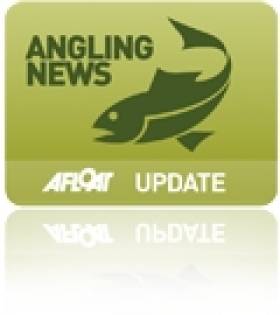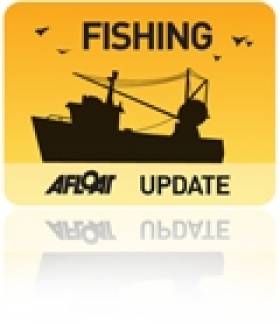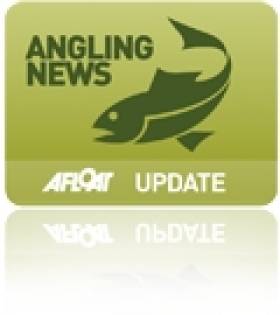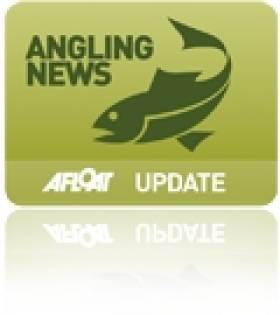Displaying items by tag: Inland Fisheries Ireland
Inland Fisheries Ireland Seeks Senior Scientist
#Jobs - Inland Fisheries Ireland (IFI) is recruiting a senior scientist with a specific focus on statistics and modelling, technical editorial support, GIS and data management.
This permanent leadership role will be part of a dynamic research team conducting research (both national and international) on Ireland’s fish species and will report to the head of research and development.
Applicants will be short listed for interview on the basis of information supplied in their CVs.
For the full job description, see the IFI website HERE. For any further details contact the HR Department, Inland Fisheries Ireland, 3044 Lake Drive, Citywest Business Campus, Dublin 24 at 01 8842 662 or [email protected].
The closing date for receipt of applications is 5pm on Friday 27 February 2015. Canvassing will disqualify. IFI is an equal opportunities employer.
Lanesborough Reopening Following Asian Clam Invasion
#asianclam – Inland Fisheries Ireland (IFI) has today confirmed that the hot-water stretch in Lanesborough, Co. Longford has re-opened to angling, under strict bio-security conditions.
Four disinfection units, funded by the ESB, have been installed by Inland Fisheries Ireland and are now operational. Two of the units are available above and below Lanesborough Bridge on the bankside, one unit is available at the Lanesborough boat slipway and the fourth unit is available on the Ballyleague angling bank.
IFI has advised that all anglers fishing on this angling stretch must disinfect all fishing equipment and waders on departure.
Signage has been erected at each disinfection unit, containing the appropriate disinfection solution, explaining how to disinfect properly. These units are secured outside normal fishing times but a contact number is available on the signage should an angler require it.
Due to the continued presence of the Asian Clam within this angling stretch, Inland Fisheries Ireland has prohibited the use of any keep net in this area for the foreseeable future.
#inlandfisheries– National policies for the management of trout, pike and bass, will be launched on Friday 22nd August by Inland Fisheries Ireland (IFI), the state agency responsible for the protection, conservation, management and promotion of Ireland's inland fisheries and sea angling resources.
The three policy documents have been formulated, through a rigorous consultation process, by groups comprising: fisheries scientists; angling federations; and industry representatives.
Speaking ahead of Friday's launch, IFI chairman, Mr Brendan O'Mahony, said, "The new policies mark a cornerstone for fisheries management in Ireland. They will have a very positive impact on the conservation and management of bass, pike and trout as well as ensure the sustainability of stocks into the future."
Flash Floods on Mulkear River Disrupt Angling
#mulkear – Inland Fisheries Ireland (IFI) is today (31.07.14) continuing to investigate the polluted condition of the Mulkear River and its tributary, the Bilboa River. These rivers form part of the Mulkear Special Area of Conservation and are essential nursery and spawning areas for Salmon, Trout and Lamprey.
At the present time, the Mulkear River is extremely discoloured by suspended solids, disrupting angling and severely curtailing other uses.
IFI staff has identified the source of pollution as being a result of last week's flash flooding, which caused a high level of suspended solids from the Gortnageragh River, a tributary of the Bilboa River located a few miles north of Doon County Limerick, to enter into the system.
The Gortnageragh River burst its banks in numerous locations and a large number of trees were washed away causing the River to be dammed at several locations. This further exacerbated the situation, as numerous new river channels are now forming, causing silt, clay, sand and gravel to be washed downstream as a heavy load of suspended solids. At one point, a new riverbed has been scoured out to a depth of approximately one metre. This is the source of discolouration in the water and will be impacting on spawning beds and nursery areas for salmon and trout.
IFI is liaising with local authorities and ESB, the fishery owner, with a view to seeing what steps can be taken to alleviate the problem. IFI believes that the removal of the obstructions should aid the river in reverting to the original river bed.
Inland Fisheries Ireland (IFI) has a confidential 24 hour hotline number to enable members of the general public to report incidents - 1890 34 74 24 or 1890 FISH 24. This phone line is designed to encourage the reporting of incidents of water pollution, illegal fishing and invasive species.
Niall Greene Appointed To Inland Fisheries Ireland Board
#Fisheries - Niall Greene has been appointed to the board of Inland Fisheries Ireland by the new Minister for Natural Resources Alex White.
Greene has worked at senior management and board level with a number of prestigious private companies in the aviation industry and public agencies over his extensive career.
He currently holds positions on a number of boards in the data management, security, aircraft and airport management industries, recently holding positions on disciplinary, audit, nomination and corporate governance sub-committee.
He also serves on the board of the Hunt Museum in Limerick, which he currently chairs.
Specific to the remit of IFI, Greene chairs the board of Salmon Watch Ireland Limited and is a member of both the Shannon Mulkear and District Anglers Association and the Tralee and District Anglers Association. He is a former member of the executive of the Federation of Irish Salmon and Sea Trout Anglers.
Green was instrumental in bringing together the three national game angling federations to form Stop Salmon Drifts Nets Now in 2004 and chaired the board during the successful 2004-7 campaign.
In 2012 he was elected co-chair of the NGO Group at the North Atlantic Salmon Conservation Organisation (NASCO) and has held a position on IFI's National Inland Fisheries Forum since 2011.
Greene, who holds LLB and LLM degrees from the University of Limerick, brings with him a vast wealth of experience and passion for conservation to the board of IFI, said the State body in a statement.
Minister Visits New Inland Fisheries Ireland HQ
#IFI - Pat Rabbitte, Minister for Communications Energy and Natural Resources, visited the new headquarters of Inland Fisheries Ireland (IFI) at Lake Drive in Citywest yesterday (4 July).
Speaking on the day, IFI chief executive Ciaran Byrne said: “We are delighted to welcome Minister Rabbitte to our new Citywest campus and bring him on a tour of our new office, to meet with staff across all functional areas here including research, business development and operations, as well as support divisions of finance, HR and logistics.
"There will be 80 members of staff based in our new headquarters, located strategically on the west side of Dublin to facilitate easy access to IFI’s other regional offices in Cork, Tipperary, Limerick, Galway, Mayo and Donegal.”
Previously the minister commented on the major factors involved in IFI's relocation to its new West Dublin campus, which "ticks all the boxes as regards accessibility, response capability on a country-wide basis, support structures and capacity for widely spread and often remote activities in resource protection, conservation and development.”
IFI is the State agency with responsibility for the protection, conservation, management and promotion of Ireland’s inland fisheries and sea angling resources.
A prosecution taken by Inland Fisheries Ireland (IFI) and the Director of Public Prosecutions for illegal netting of bass at Helvic, Dungarvan Bay, Co Waterford resulted in a conviction and heavy fine for a Dungarvan man at a recent sitting of the District Court in Dungarvan. Mr. Adrian Healey pleaded guilty to three charges under Statutory Instrument (S.I.) 230 of 2006 (Bass Conservation of Stocks Regulations) and two charges under the 1959 Fisheries Act as amended.
Mr. Tony O Dwyer, an Inspector with IFI, outlined to Judge Finn that six IFI officers were involved in what was an ongoing investigation following several reports of illegal netting of bass and sea trout at night, off the Waterford coast. IFI officers were observing the coast at Helvic in an attempt to find if illegal netting was occurring. Mr. Healy was found in possession of a boat, a 426 yard net, 11 bass, 9 pollack and one mackerel at Helvic pier at approximately 0300 hours on the 5th of September 2013. Mr. Healy was co-operative when approached by IFI officers who seized the net and bass. Solicitor Burke who represented Mr. Healy outlined mitigating factors explaining that Mr. Healy had a small fish dealer business, Abbeyside Seafoods, which he was trying to get off the ground at the time and that he was under pressure with a young family and made a mistake which he admitted to. Mr. Healy no longer has this business. Mr. Burke also highlighted that net fishing for bass was not illegal in other European jurisdictions and that Mr. Healy's net was also automatically forfeited following the conviction.
Having heard the evidence Judge Finn convicted Mr. Healy and imposed fines totalling €4,000.00 and awarded legal expenses of €674.89 to Inland Fisheries Ireland. The three counts under SI 230 of 2006 have a maximum fine of €5,000 each if heard in the District Court while the two counts under the Fisheries Act have a maximum penalty €2,000 each or 6 months imprisonment if heard in the District Court.
Net fishing for bass is illegal and such activity has the potential to do huge damage to stocks. Securing a conviction for illegal netting at night takes significant resources and dedication of staff and such night time activity is usually undertaken in an attempt to evade apprehension by fisheries officers. The sale of wild Irish bass is also illegal and it is important the public do not support illegal fishing by buying these fish.
#Angling - Inland Fisheries Ireland (IFI) secured a conviction for illegal fishing in Waterford earlier this month over an incident last summer that quickly escalated from a fisheries investigation to a search and rescue operation.
Brendan Keane was prosecuted for illegal netting of bass in Tramore Bay on 25 August 2013 at a sitting of the District Court last Wednesday 2 May.
Keane, of Grantstown in Co Waterford, pleaded guilty to possession of a net, use of a boat while illegal fishing, and obstructing and impeding IFI officers, all contrary to the 1959 Fisheries Consolidation Act, and possession of nine bass contrary to a 2007 bye-law.
IFI inspector Tony O'Dwyer outlined in detail to Judge Kevin Staunton the complex series of events which unfolded when he and a colleague, with co-operation from the Garda, were investigating illegal netting of fish near Saleens, Co Waterford around 5am on the day in question.
O'Dwyer and fishery officer Isaac Ferns discovered Keane and an accomplice illegally fishing with a net and a small boat under cover of darkness in an area renowned by anglers for its stocks of salmon, sea trout and in particular wild bass, the sale of which is banned in Ireland.
When confronted, Keane began aggressively swinging an oar and roaring obscenities at the two IFI officers, and the court heard he was searching for his gun in the boat when the officers approached as he came ashore.
Keane and his accomplice retreated back to the open sea in their tiny unseaworthy boat, putting them in extreme danger. The tiny craft was not capable of dealing with the sea conditions and Keane had no buoyancy aid or lifejacket.
Gardaí involved in the incident said they were left with no choice but to alert the RNLI and Irish Coast Guard when what began as a fisheries investigation turned into a multi-agency marine search operation, including the deployment of a rescue helicopter when Keane's boat as round drifting without passengers.
Keane and his accomplice were subsequently found safely ashore but both refused to admit to gardaí that they had been the occupants of the drifting vessel.
IFI staff seized the small craft and a 120-metre drift net along with nine dead bass during the investigation.
Judge Kevin Staunton convicted Keane, imposing a four-month suspended sentence, with fines totalling €3,000, and awarding expenses of €751.02 to IFI. Keane’s boat and net were also forfeited.
Meanwhile in Galway, Judge Mary Fahy convicted two men of illegal fishing on the Clare River last summer at a sitting of Galway District Court on Tuesday 6 May.
James Fahy, of Ballindooley in Co Galway, was convicted of three offences on two dates in June and August 2013, while Michael McGath, of Castlegar in Co Galway, was convicted of one offence in August 2013.
Judge Fahy heard evidence from fisheries inspector Pat Gorman that on 18 June last James Fahy was observed using a net on the Clare River.
When approached, Fahy attempted to reverse his vehicle away down a side road, but fishery officers intervened. During the incident fishery officer Paul Reynolds was assaulted. Fahy was apprehended, and a search of the vehicle revealed a net, six large salmon and two large trout.
Fahy pleaded guilty to illegal possession of the fish, and to assault and obstruction. He pleaded guilty to a further charge of illegal possession of a net at the same location on 11 August, when he was again observed by fishery officers fishing and then concealing a net.
Judge Fahy convicted James Fahy and fined him €1,750 with €600 costs, and ordered him to pay €500 compensation to Reynolds. The judge also commented in court that illegal fishing hits already depleted fish stocks, and affects tourism.
She considered a driving disqualification in light of the use of the vehicle in the course of the offence, but as this was a first offence a driving ban was not imposed.
At the same court sitting, Michael McGath was convicted of illegal possession of a net on 11 August, and fined €100 with €600 costs.
Minister Welcomes IFI To New Citywest HQ
#IFI - Minister for Communications Energy and Natural Resources Pat Rabbitte has welcomed the arrival of Inland Fisheries Ireland (IFI) to its new headquarters at Lake Drive in Citywest.
On its establishment in 2010, IFI had accommodation at three locations in Swords, including leasing a headquarters building, and premises in Glasnevin and Blackrock.
But this year, as part of a strategic rationalisation, and in keeping with Government policy to exit from expensive leases wherever possible, IFI exercised the break clause on the Swords Headquarters when it arose and has already disposed of the Glasnevin premises.
“Accommodation is among the most significant cost components of public sector organisations, and in line with Government policy the board of IFI has undertaken a strategic rationalisation of its Dublin-based accommodation," said the minister.
"Following a review of some 100 options, the board has decided that Citywest is the optimal location."
Minister Rabbitte added that the major factors in this relocation "are the strategic and operational efficiency of Inland Fisheries Ireland as a national body with a strong statutory responsibility serving all parts of the country and the retention and development of invaluable technical, scientific and administrative expertise and experience.
“Citywest ticks all the boxes as regards accessibility, response capability on a country-wide basis, support structures and capacity for widely spread and often remote activities in resource protection, conservation and development.”
The minister's department says the rationalisation and amalgamation of all Dublin property is expected to generate efficiencies and savings over time in relation to lease rents.
In addition, the significantly better energy efficiency of the new headquarters facility in Citywest will be consistent with Government commitments as regards reducing CO2 emissions and energy consumption, will also generate efficiencies.
Inland Fisheries Ireland Moving To New HQ
#Angling - Inland Fisheries Ireland is on the move from its old offices in Blackrock and Swords to new headquarters at Citywest Business Campus.
As of Friday 25 April, all correspondence for staff at the State agency for inland fisheries and sea angling should be addressed to:
Inland Fisheries Ireland,
3044 Lake Drive,
Citywest Business Campus,
Dublin 24
Phone numbers will remain unchanged after the move, however 01 884 2600 and 01 278 7022 are currently offline until 7am on Monday 28 April.
During this period you can call IFI's other offices or the hotline on 1850 34 74 24 as normal.
Email is also offline until 7am on Monday. IFI apologises for any inconvenience caused.




























